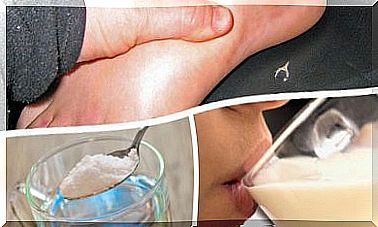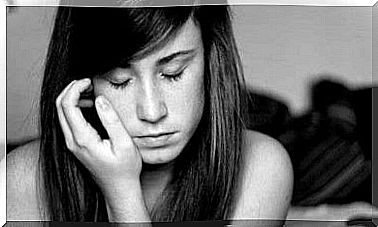Hypothyroidism – Warning Signs Of An Underactive Thyroid
Although symptoms of an underactive thyroid are similar to those of other diseases, the occurrence of several of these symptoms is a warning signal. If this happens, see a doctor to see if you have hypothyroidism.

An underactive thyroid, known as hypothyroidism in technical terms , is associated with limited hormone production by this organ.
The thyroid gland produces hormones that regulate innumerable metabolic processes, which is why a functional impairment causes symptoms that affect various tissues.
The health and well-being of the entire organism are impaired if the organ is not working properly and the thyroid gland is underactive . Nevertheless, many often ignore the first signs and thus miss the chance of an early diagnosis.
That is why we have compiled the main symptoms of hypothyroidism in this article .
Signs of underactive thyroid
Permanent feeling of cold

Because the metabolism only functions to a limited extent when the thyroid gland is underactive , those affected feel a permanent cold feeling. They freeze even when they know that their surroundings are well warmed.
A persistent feeling of cold is one of the most important symptoms in diagnosing hypothyroidism.
The doctor calls this symptom cold intolerance. Incidentally, with an overactive thyroid gland, hyperthyroidism, heat intolerance occurs because the metabolism is excessively active and produces too much heat.
Women in particular tend to be cold, even when the male companion complains of heat. And of course, you should make sure your heating is working before you see a doctor. It’s normal for us to freeze when it’s cold.
But if you can exclude climatic influences and yet the feeling have, to be frozen to the bone, then consult a doctor.
Sudden change in weight

The restricted metabolism is also responsible for the fact that sudden weight gains occur regularly when the thyroid is underactive . It’s not for nothing that we talk so often about stimulating the metabolism in order to lose weight.
If you have hypothyroidism and gain weight as a result, this weight gain has no counterpart in changing eating habits. The weight gain is sudden and unexpected.
It is based on the fact that the hormonal balance, which regulates the burning and storage of energy in the form of fat , is unbalanced. In the absence of thyroid hormones, the fat will not be adequately burned.
Muscle pain and cramps
Do you often suffer from muscle aches and cramps for no explanation? They are not related to intense physical activity? Then they can be a symptom of hypothyroidism.
If the thyroid is underactive, painful processes occur in the muscles and joints. This mainly affects the hands and legs.
Mental fatigue
Do you have the feeling that you often forget things and are simply mentally drained ? And that even though you eat a healthy and balanced diet?
A stressful working day in which we do not allow ourselves the necessary rest breaks due to lack of time can also lead to mental fatigue.
However, if even the vacation you deserve does not bring the necessary rest or you have not suffered from stress from the start, hypothyroidism should be considered.
Your organs work because hormones and other messenger substances stimulate them to do so. That goes for your brain too. And when there is a lack of thyroid hormones, your brain cannot function normally.
That is why this feeling of mental fatigue arises. Feeling “done” every now and then is normal. We all have days like this. However, if this feeling occurs constantly, then it is pathological and can indicate serious illnesses.
depression

The depression arises in the head. This symptom is closely related to the previously mentioned one, mental fatigue. Perhaps the depression can even be described as increased mental exhaustion.
If you have lost all motivation for everyday activities, can no longer get excited about things you used to enjoy, or feel depressed, then you are probably suffering from depression or a depressed mood
A hypothyroidism can lead to this upset. This is due to the fact that the hormonal balance is no longer maintained. That is why behavioral therapies do not lead to success in this case either.
The hypothyroidism must then be treated with medication. Your doctor will make a treatment plan that you should also follow. It will likely take some time to find the optimal dose for you.
So you will need a little patience, but this is the only way to restore the hormonal balance.
Brittle hair and hair loss
An underactive thyroid causes various skin and hair problems. Typical symptoms of an underactive thyroid are thin, dry hair that tends to split ends and falls out more often.
If you’ve always had healthy, strong hair and suddenly notice these problems, then you should get to the bottom of them. They don’t have to be caused by hypothyroidism, especially if you can’t identify any of the other symptoms, but they have a cause.
Changes in diet and lifestyle also affect the growth and condition of hair. Do family members suffer from similar problems? Then maybe they have a genetic cause.
If you can’t find the cause of these problems suddenly appearing, see a doctor and see if it’s a hormonal disorder.
Dry skin and nails
Dry skin and dry nails are not clear, but very clear signs of hypothyroidism.
You know your body, you know how it reacts to weather and other influences. If you struggle with dry skin every winter, so will it this winter. Between dry heating air and cold wind, it’s really hard to keep healthy, soft skin.
If you can rule out the circumstances as the cause of dry skin and nail problems, then hypothyroidism should be investigated.
The problem with dry skin is that it tears and these injuries can easily become infected. So it must be treated accordingly from the start. Incidentally, this not only applies to thyroid-related skin problems, but also, for example, to diabetes mellitus.
Decreased libido

Have you noticed that your libido has dropped sharply without you being able to identify a cause?
Psychological stress or problems with the partner are probably the most common causes of a loss of libido. It should also be clarified whether you suffer from circulatory problems. The use of the pill may also cause a reduction in libido.
In most cases, a loss of libido is nothing more than a symptom of an underlying disease. The libido returns as soon as it is treated.
All of the symptoms mentioned in this article can be caused by conditions other than hypothyroidism.
However , if you can detect more than two of these signs, it is likely to have an underactive thyroid. In any case, a doctor should confirm the diagnosis, with whom you will also have to work on a treatment plan if the worst comes to the worst.
If you only notice individual symptoms that are so severe that they burden you and limit your everyday life, you should also consult a doctor to clarify the cause.
Doctors can usually diagnose hypothyroidism in a relatively short amount of time and do not require complicated diagnostic procedures.









